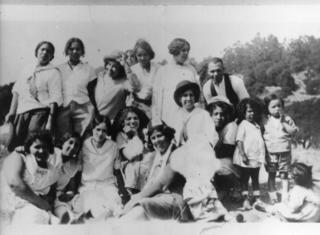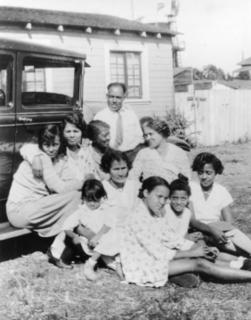
Thinking today about just what it means to be "poor."
Funny, that might be the least relevant term to use when referring to Creole people or culture. That's simply not an accurate measure of worth for us. I'm certain that -- were I using the values of the European acquisitive and materialistic society that now forms the adopted values of my life -- that word might be fitting. But in the context of New Orleans and all that flowed therefrom, economic worth is fairly irrelevant.
I surely remember being young and crowded into a bedroom that housed all three of us (my sisters and me) in the small 2 bedroom cottage in East Oakland where we grew up. I remember my mother and her bridge clubmembers traveling across town on the bus carrying folding chairs and maybe even a card table to the home of the hostess for the week. I know about Mom getting up early on Thursday mornings to be among the first to "Sally Ann's" (Salvation Army store) for the best pickin's because that was the day that the truck delivered new old stuff to the local store. I know about "red beans and rice on Mondays" and sleeping under blankets monogrammed with SP in the corners (Southern Pacific Railroad). I spent many a day at the free clinic getting shots and some pretty rugged dental care. I remember watching my mother and her friends gathering together to chop, mince, and stir the fixin's for the hoghead cheese with its garlicky aroma and gelatinous texture that we got to taste with salted crackers the next day after it had all been divied up and slipped into cheesecloth packages for sharing. I know how grateful my mother and aunts were when the husbands who traveled the rails as porters came home with brown bags of file (pronounced fee-lay) for gumbo that couldn't be found anywhere in this new West Coast territory we Creoles now called home. I know about collecting bottles to return for a few cents each in order to see the Saturday matinee. I'm aware of all that -- but I scarcely have any memory at all of being "poor."

Makes me wonder what was different about that? Wondering if "poor" is a relative term that has little meaning if everyone in your world is at the same status? How on earth would we have known what "rich" meant, except in a kind of mythic sense of those we saw on the silver screen -- and everybody knew that was make believe, right? After all, I grew up during the depression years.
Maybe poor is a word that is always imposed externally. rarely recognized from inside. But then maybe -- since television was not a part of our world -- we had little need to deal with comparisons. I suppose I must have had some sense of where we were on the economic scale by the time we were adolescents, but I'm not sure it was true even then. By that time we'd created our own criteria and it included the uniqueness that comes with a Creole heritage. We were a proud people with standards that were considerably higher than many that we lived among. We were just one more second generation ethnic group, transplanted complete with the patois (at least among our elders) superstitions, folklore, songs, music, a cuisine, and dimming memories of "home."
I figure that those who now describe those "poor" folk from the Ninth Ward have only a part of the story. So much of the culture has been retained in the DNA of even the "poorest." I felt it watching the "Live From Lincoln Center" presentation for the benefit of New Orleans musicians effected by the floods. When those men marched in with their rhythmic beat -- "humph!," -- the off-count toss of the head in unison -- and the staccato hand clap that I'm certain few white folks that I know could have mastered no matter how hip they believed themselves to be. I felt the presence of my father over my shoulder -- with his hand-painted baby blue leaky cornet and uncle Louis' raggedy bent up drums -- and Dick Dewson's tinny piano -- on any Saturday night of crawfish caught in the creeks in Niles Canyon boiled scarlet and served on spread out newspaper with home brew (if it hadn't exploded in the process of becoming!) at 1322 83rd Avenue in Oakland, California. How they would have resonated to Wynton Marsalis' music!
We'd all have become second liners with kazoos, pots and pans with wooden spoons, combs and tissue paper!
Poor?
Hell no! And envied by many for the gifts of jazz and good times that Creole's have brought to the world.
Rich beyond measure.
Photo #1: Mother's Creole social club on a picnic at Leona Heights near East Oakland. (front row) Alberta Cashin (wife of George), can't recall second face but the third is Ethel Aubert (married to Gene), Mabel Allen (husband Ellis), Marie Gaudet Allen (wife of Herman), Ruth Smith, unknown, little girls Arlene Cashin and Josephine Aubert with my younger sister, baby Lottie Charbonnet (now Fields) with back to camera in the far right corner. Back row -- the first 3 women on the left I can't identify but Lucille Towns (wife of Roy) and Marjorie Ledford (wife of Claude) with my uncle Lloyd Allen horning in on the party at the far right.
Photo #2: Papa George's Model T adorned by his family. Lower row my sister, Marjorie (Charbonnet-Brooms), me (Betty), Aunt Audrey Kingsbury Allen (wife of Fred), Second row, youngest sister, Lottie (Charbonnet Balugo Fields) in the arms of Teen-dah (friend of my grandmother's) with Papa's sister, Isabel Allen LeBeouf Warnie. Seated on the running-board is my mother, Lottie (Allen Charbonnet), who looks traumatized - having just arrived in California from the hurricane-flooded New Orleans with Sarah LeBeouf (wife of Melville) and Papa's third wife, Louise Breaux Allen. Uncle Herman Allen (husband of Marie Gaudet Allen) towering over all.
No comments:
Post a Comment